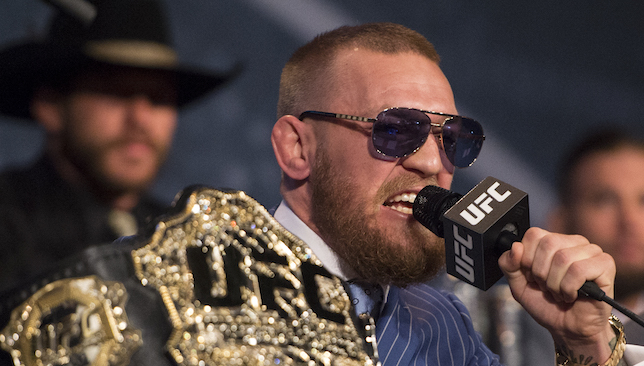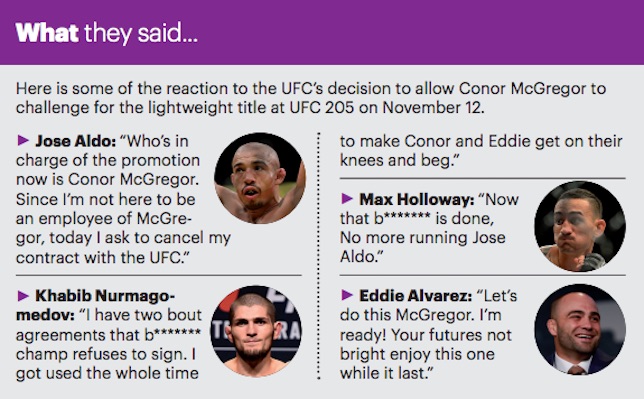
A bespectacled Conor McGregor has become a regular sight at UFC press conferences lately. Whether for function or fashion, the look has become his trademark but not even the Irishman’s improved vision could distinguish the line he is frequently forcing the UFC to cross.
Sport, competition and merit may be intrinsically linked to entertainment in MMA. But what’s obvious right now, is that the UFC only has eyes for one side of the divide as the line between the two becomes increasingly more blurred in the McGregor era. As a result, an undercurrent of discontent, justifiably so, is beginning to surface from the promotion’s roster.
The featherweight champion has emerged as something of a double-edged sword for the UFC and it’s putting president Dana White in an uncomfortable position. Indeed, McGregor’s theatrics both in and outside the Octagon have elevated the sport to a level of notoriety always craved but never captured. But it’s coming at a cost.
Naturally, the UFC are cashing in on his mainstream appeal by allowing him to plot his own path. How long can they afford to indulge his experiments at the expense of its other fighters, though? No single athlete is bigger than the UFC, history tells us that, but there’s no doubt McGregor possesses an unprecedented amount of leverage.
He knows how to use it, too. After knocking out Jose Aldo in 13 seconds to claim the featherweight title in December, he then pressured the UFC to allow him to move up to lightweight to pursue a money-spinning superfight. Of course, the then-champ Rafael dos Anjos suffered an injury and when Nate Diaz was hauled in on short notice, he ripped up the script and a new tangent was formed.

After generating one of the most lucrative pay-per-view shows in the company’s history at UFC 196, McGregor was then able to sidestep a maiden defence of his 145lbs crown again, in favour of the rematch at UFC 202. Once more, the sport made way for the money as rivals with a merited shot at the title were forced to wait as the division’s king sought to expand his empire elsewhere.
The UFC are unapologetic in that fact, given the event went on to break just about every metric on record. But indulging McGregor for a third time by allowing him to take on Eddie Alvarez for the 155lbs belt at the momentous UFC 205 card in New York, has forced disgruntled competitors to push back.
The undefeated Khabib Nurmagomedov, who signed his side of a contract to face Alvarez at either UFC 205 or 206, felt he had been used by the promotion to force McGregor’s hand when the New York talks stalled.
Aldo, too, had his own objection having been promised the rematch with the ‘Notorious’ after he claimed the interim 145lbs belt at UFC 200. His revulsion is so deep, the Brazilian has even requested to be released from his UFC contract labelling the promotion as a “circus”. Can you blame them for their frustration?
Bring It #UFC205 https://t.co/jCKxEjwUw6
— Conor McGregor News (@ConormcGregor5) October 2, 2016
The problem is, both sides of the divide have merit in their arguments. The UFC, after all, is a business and the man from Emerald Isle is a green-making machine. Conversely, though, this is a sport and considering the UFC has long been desperate to run parallel with some of the biggest professional leagues in the world, disregarding the rankings and fighters’ accomplishments is not the way to achieve that target.
The McGregor era has yielded unprecedented monetary benefits for a company recently sold for $4 billion. Clearly, White and the new owners WME-IMG consider the UFC a business entity so therefore if the dollars add up, it makes sense.
There are those, though, who believe the UFC is a sports league but on the current evidence, that’s not the case. You don’t need glasses to see that.